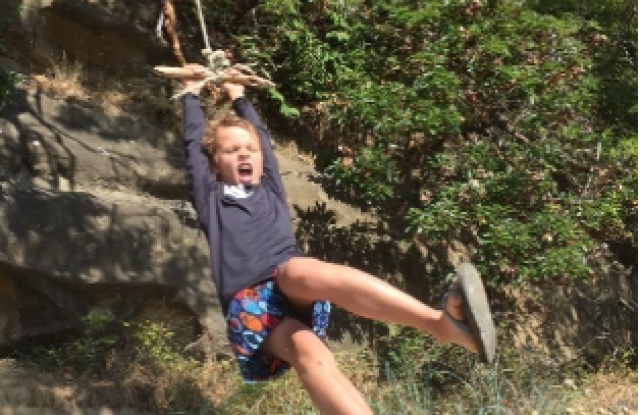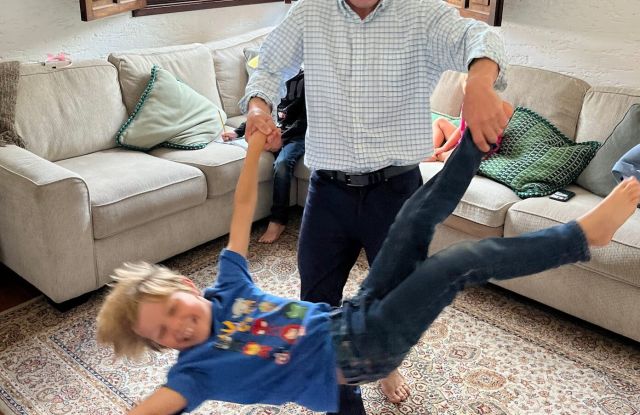How do I raise kids who thrive?

Jeff Goins wrote an essay this week on the compulsive busyness of parents. Often, as parents, we find ourselves overwhelmed – living lives that are jam-packed. Between our own To-do list and driving kids places, we’re often exhausted. It’s a subject I’ve wrestled with. I’m 65 and we raised 5 kids who are now raising a total of 9 of our grandkids. Here are the top 5 lessons I learned as a parent to help my children thrive:
1. Love & discipline
Kids need to know that they are loved without conditions. Ross Campbell in How to Really Love Your Child talked about hugs, eye contact, and focused attention. This helps your kids to attach and feel secure – nothing is more important in rearing children. And of course, discipline is a form of love as well. Kids need to learn boundaries and responsibility. I watch a lot of parents try to reason with their toddlers instead of just spelling out expectations and then delivering on the consequences. Talking to a barely verbal toddler doesn’t prepare the child for real life where actions have consequences. It teaches them to try and negotiate.
2. Learn to say NO
Even before cell phones and the internet, we had way more opportunities than we had time. Karen quit her job as a teacher in order to raise the kids. But she chose not to spend that time as a chauffeur. The kids got to pick one sport to focus on – this alone had her in the car driving them a lot. Saying NO gave us space to spend time in activities that we cared about.
There are so many toxic elements of society that parents have to buffer their children from. For example, we were also very involved in who we let them hang around – we didn’t need to be fighting bad influences.
3. Prioritize family
Emily Davis says, “We need to build a bigger table.” We prioritized family dinners and time together. This was more important than the kids’ extracurricular activities. We also prioritized connecting our kids to God and to faith. I had devotions with our kiddos daily. In the evening, after work, I would play in the park with them. Then I’d have time with Karen to debrief the day. I took the kids out on an outdoor adventure on Saturdays to give Karen a break. I also tried to take them as individuals on dates or on mission trips. Overall, we scaled our standard of living to fit my moderate salary. Families today live in homes that are too big and buy too much stuff on credit.
Yes, that may all sound like quite a lot, especially for five children. But we were able to say YES to all this because we’d said NO to less important things.
4. Prioritize community
We raised our kids in tandem with a few other families as members of a close small group that now still gets together every other year. We did everything together and formed a tight-knit community with a God-focused culture. It made child-rearing so much easier.
When our oldest was 11, Karen could see that the suburban community we lived in was beginning to exert an outsized influence on our kids and posed a significant challenge to our vision for them. We chose a radical response – we moved to the country where we could restore our influence in their lives.
This proved to be a great decision. Kids need to build forts in the woods. They need to be in nature. They need to be free of the distractions and toxicity of social media. Looking back, I can see more clearly how close we came to losing the influence we had as parents. When kids hit adolescence, as parents, you are just a few years from launching them and you need to do whatever is necessary to launch them well.
5. Fight entitlement by serving
Entitlement has become an epidemic. Kids’ expectations are so high they don’t know what things are worth or how to express appreciation. I loved the episode in the Bill Cosby Show where his daughter, Vanessa, looked at all the stuff in her house and declared, “Dad, we’re rich!” To which Cosby responded, “No, I’m rich – you’re poor!”
To teach our kids responsibility, we gave them regular chores. We also gave them opportunities to serve others needier than themselves. I was so proud of Karen the day she took a couple of the kids to the church so they could help clean it.
All this sounds counter-culture and maybe a bit radical. It helps to find mentors who can help you understand strategy at a time when so much is changing. Parents are up against a huge challenge in a society where it is normal for young people to be anxious. We need to consider whatever it takes to really help their kids get to a place where they are thriving as adults.
On the other side of our parenting project, Karen and I are thrilled with the way our kids are continuing to live their lives and invest deeply in their children. As we see our grandchildren growing up, we see that the hard work was worth it.



As parents to 8 children, we enjoyed reading this post! Thank you
8 children – wow!
Outstanding. Clear. Right on. Thank you.
Choices can be hard but necessary. Finances are often stretched, but limitations can be a doorway to special opportunities – time 1-to-1 with Mom or Dad as you described for example – can in the end cultivate a thankful spirit.
Thanks, Brian. Thanks for being such good friends for my parents. You excel at that.
Thanks for this, Seth. I continue to learn from you (and Karen) as Kim and I are still in the throes of raising what is (in effect) our second batch of kids. We have made some adjustments, and are trying to do some things differently with our 3 littles. The battle with busyness is real, and we are fighting that one. We need to find/create a close-knit group of friends to walk with here in our new setting out in the country. I’d say that’s one of our greatest needs at this point. It’s been helpful to be reminded that we get to choose our direction. We want to stake out our values and live according to them, rather than simply allowing life to “happen” to us. I want to live with greater intentionality, simplicity, and to make sure that we are discipling our kids, apprenticing them into the Jesus-way of life.
Stacy – raising 9 kids, you all have so much to teach the rest of us! I pray that you find the family friends that can do life with you. Let’s connect soon.